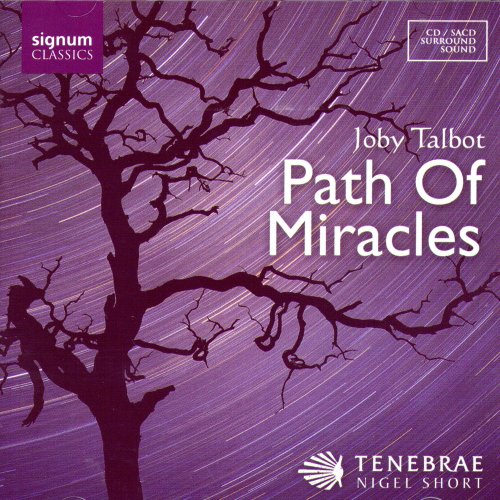
Tenebrae, Nigel Short - Joby Talbot: Path of Miracles (2006)
BAND/ARTIST: Tenebrae, Nigel Short
- Title: Joby Talbot: Path of Miracles
- Year Of Release: 2006
- Label: Signum Records
- Genre: Classical
- Quality: FLAC (tracks)
- Total Time: 01:02:22
- Total Size: 284 mb
- WebSite: Album Preview
Tracklist:
1. Roncesvalles (Talbot) 17:22
2. Burgos (Talbot) 15:03
3. Leon (Talbot) 11:44
4. Santiago (Talbot 18:13
Performers:
Tenebrae
Nigel Short
1. Roncesvalles (Talbot) 17:22
2. Burgos (Talbot) 15:03
3. Leon (Talbot) 11:44
4. Santiago (Talbot 18:13
Performers:
Tenebrae
Nigel Short
Joby Talbot was in the band that provided music for that divine comedy Father Ted. After such beatification by association, the only way would seem to be down, yet he continued to produce works of considerable quality and imagination.
'Roncesvalles', 'Burgos', 'Leon' and 'Santiago', the movements of Path of Miracles, are named after four points on the Camino Frances, one of the principal pilgrims' routes to Santiago de Compostela. The vivid libretto was compiled by poet Robert Dickinson from medieval texts (including the Carmina Burana), the Psalms and his own original reflections. Those words, and a visit to the main sites along the route, evidently inspired Talbot: this is a work of remarkable range and assurance.
'Roncesvalles' opens with eerie, long-held tones in the bass register, gradually hauled up to a radiant chord in the higher voices. The passage was inspired by a technique used in traditional Taiwanese music but one could just as well imagine it as a synthesis of Ligeti and Pärt. The movement goes on to describe Herod's execution of St James, and the eventual discovery of the body at Compostela, in a rich, agile, vibrant evocation of medieval dances and hymns.
Throughout the work Talbot achieves a similarly fertile accommodation between ancient shapes and contemporary colours, moulding often challenging parts into a luminous and uplifting whole. Let's hope for further collaborations between Talbot and the splendid Tenebrae, whose beauty of sound is matched by clarity of diction.
'Roncesvalles', 'Burgos', 'Leon' and 'Santiago', the movements of Path of Miracles, are named after four points on the Camino Frances, one of the principal pilgrims' routes to Santiago de Compostela. The vivid libretto was compiled by poet Robert Dickinson from medieval texts (including the Carmina Burana), the Psalms and his own original reflections. Those words, and a visit to the main sites along the route, evidently inspired Talbot: this is a work of remarkable range and assurance.
'Roncesvalles' opens with eerie, long-held tones in the bass register, gradually hauled up to a radiant chord in the higher voices. The passage was inspired by a technique used in traditional Taiwanese music but one could just as well imagine it as a synthesis of Ligeti and Pärt. The movement goes on to describe Herod's execution of St James, and the eventual discovery of the body at Compostela, in a rich, agile, vibrant evocation of medieval dances and hymns.
Throughout the work Talbot achieves a similarly fertile accommodation between ancient shapes and contemporary colours, moulding often challenging parts into a luminous and uplifting whole. Let's hope for further collaborations between Talbot and the splendid Tenebrae, whose beauty of sound is matched by clarity of diction.
As a ISRA.CLOUD's PREMIUM member you will have the following benefits:
- Unlimited high speed downloads
- Download directly without waiting time
- Unlimited parallel downloads
- Support for download accelerators
- No advertising
- Resume broken downloads


